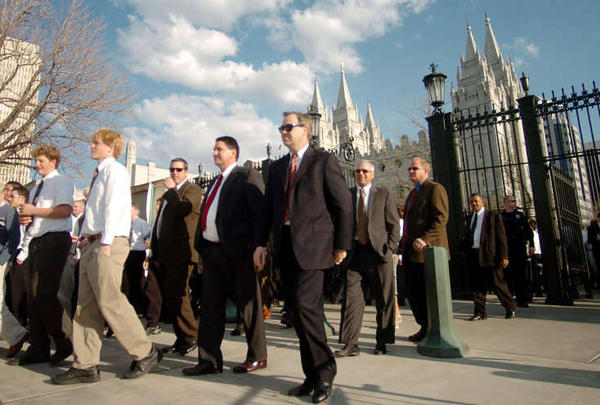Author: Nate Oman
-
Thoughts on a Modern English Translation of the Scriptures
The Church recently announced that is going to be publishing an LDS “translation” of the Bible in Portuguese. I put “translation” in scare quotes because this is not a new Portuguese version of the Bible translated from the original Greek and Hebrew. Rather, it takes a previous Portuguese translation now in the public domain and…
-
Covenant and Speech
Membership in the Church is a covenant relationship. We repeat this to ourselves a great deal but generally aren’t clear exactly what we mean by it. Often, we imagine a covenant as a contract, a set of reciprocal promises. Given what the scriptures say about covenants, this isn’t a false way of thinking about it,…
-
The Most Important Question about the Future of Mormonism
A couple of weeks ago, Patheos had a fun series of blog posts on the future of the Mormonism. (I’m too lazy to provide a link; Google it.) Most of the contributions were insightful and interesting, but I was struck that none of them put front and center what I think is the more important…
-
My Theory of the Church’s Statement on the Change in BSA Policy
Yesterday my Facebook feed erupted with posts by LDS friends expressing dismay over the Church’s announcement that it would reconsider its relationship with the BSA in light of the BSA’s announcement that it would now allow gay scoutmasters. After all, the BSA policy allows local troops to set their own guidelines regarding gay scoutmasters, and…
-
Some things Jana Riess gets wrong about the Church and religious freedom
I like and respect Jana Riess a great deal, but she has a blog post up on religious freedom in which she makes a number of mistaken claims that are worth pointing out. First, she suggests that the Church´s commitment to religious freedom is shallow or poorly thought out. After all, she says, wouldn´t a…
-
The Influence of Law on Mormon Theology in the 20th Century
I recently published an article that T&S readers might find interesting. It traces the legal issues faced by the Church as a result of its international expansion after 1945, arguing that the pressures created by these concerns tended to modify Mormon theologies of the state in the last half of the twentieth century. There is…
-
Mormons and Politics
Readers may be interested in a recent episode of the “Research on Religion Podcast,” featuring Quin Monson (BYU) and Dave Campbell (Notre Dame) discussing their new book Seeking the Promised Land: Mormons and American Politics (also co-authored with John C. Green). The book is the first full length study by professional political scientists of the…
-
Doux Commerce in the City of God
I just put up an essay at the Social Science Research Network (SSRN) that readers of this blog might find interesting. It’s a response to some of Hugh Nibley’s writings on Zion and commerce. Nibley was famously critical of the mercantile ethic, arguing that trade and capitalism were fundamentally hostile to the ideal of Zion.…
-
Announcement: Faith & Knowledge Conference at UVa
THE FIFTH BIENNIAL FAITH AND KNOWLEDGE CONFERENCE UNIVERSITY OF VIRGINIA CHARLOTTESVILLE, VA FEBRUARY 27-28, 2015 The Faith and Knowledge Conference was established in 2006 to bring together LDS graduate students in religious studies and related disciplines in order to explore the interactions between religious faith and scholarship. During the past four conferences, students have shared…
-
Discussion, Advocacy, and Some Thoughts on Practical Reasoning
I am saddened by Kate Kelly’s excommunication. I wish that events had played out differently. Excommunication in this case strikes me as the worst outcome for all concerned, although obviously my opinion on this matter does not – and should not – matter. I believe her when she says that the decision is extremely painful…
-
Why is the Church Handbook of Instructions not Public?
I don’t know the answer to this question. Let me suggest some possibilities: Perhaps the Brethren are worried that publishing the Handbook will encourage people to treat it as a legal text. There are two possible problems with this. It might then encourage people to use deviation from the Handbook to attack priesthood leaders, when…
-
Some Thoughts on Church Courts
Karen Hall has an interesting post on church courts that’s worth reading. Her basic point is that church courts fail to comply with some rule of law norms. I would quibble with some of her points. For example I think she slips from the idea of rule of law to the narrower idea of an…
-
Elliot Rodger, Sex, the Good Life, and the Peril of Rights
There are certain things that we need and desire. Among these is love and sex. I conjoin two words, but I mean it to refer to a single whole, the embodied connection of affection, commitment, and pleasure that comes in the mutual giving of two people of themselves to each other. That. It’s a longing…
-
The Message of Mormonism (pt. 2): Angels, Visions, Prophets, and Gifts of the Spirit
In my last post I talked about Mormonism as an answer to the question, “Which church is true?” and suggested that this question has only been compelling on a large scale in fairly limited circumstances. I ought to note here that I am not trying to come up with some kind of general explanation for…
-
The Message of Mormonism (pt. 1): Which Church is True?
This is the first in a series of posts in which I lay out some of my thoughts on what Mormonism’s message to the world has been and what it might become in the next generation or two. It’s a big topic, and I’m likely to yammer on at some length. You have been warned.…
-
So Who Gets a Press Conference in Front of the Tabernacle?
One of the aspects of the Church’s recent statement to OW regarding the priesthood session that strikes me as eminently sensible is the insistence that OW not invite media on to Temple Square and confine their demonstrations to public property. It’s worth noting that the letter didn’t say that OW members could not come on…
-
A Discarded Draft
The following draft of a letter was discovered in the waste paper basket at the Church Public Affairs Office:* Dear Sister Kelly, We have received your request for a ticket to attend the Priesthood Session of April General Conference. The purpose of this session is to provide instruction from Church leaders specifically for men and…
-
Some Ironies of Continuing Revelation
I was recently having a conversation with an orthodox Jewish law professor about the challenges faced by Mormons and orthodox Jews as they seek to adapt their religion to life in liberal societies. He was struck by the parallels between Jewish and Mormon discussions, and then said, “Of course, I assume that the idea of…
-
Why Equality is a Feeling
This is a little long. Bear with me. “Equality is not a feeling” has emerged as something of a slogan among some Mormon feminists. It’s offered as a reply to those who insist that many (most?) Mormon women feel loved and valued within the Church, aren’t pushing for radical reforms, or the like. These women…
-
Some Thoughts on the Inevitable Failure of the Ordain Women Movement
It’s hard to know the future, but I will hazard a prediction: the Ordain Women project will fail. If I understand its ambitions correctly, Ordain Women would define success as an announcement that the prophet, having followed the invitation of these faithfully agitating sisters, has gone to the Lord and has received a revelation that…
-
Brandon Flowers and the Song of Redeeming Love
This is going to meander a bit at first but bear with me. Each semester I have to grade something like 1,340,567 pages of student exams. It is horrible. To dull the pain, I pick a new music group each semester as my “grading discovery.” Last semester I picked Brandon Flowers and the Killers. I’d…
-
Intellectual Disaffection and “The Biggest Tax Cut in History”
There are lots of stories on the Internet about people who have discovered things about Mormon history and left the Church. Indeed, these kinds of exit narratives have reached the point of cultural saliency that the New York Times and other media outlets have picked up on the story. I have repeatedly read or heard…
-

Men, Women, and Priesthood Session
In case you haven’t heard, members of the Ordain Women movement tried to attend the priesthood session of general conference and were turned away. I think that turning them away was a mistake, but I also think that it would be a bad idea for women to begin attending the priesthood session of conference. First,…
-
Chastity and Virginity
I have been trying to think through Elizabeth Smart’s remarks about chewed up gum and the way that we teach chastity to our youth. I have never heard the chewed up gum analogy, but I remember stories about cupcakes passed around and similar visual aids. I always thought there was something ugly about these lessons.…
-
Why Gay Marriages are a Good Idea but Marriage Equality Worries Me
Last week, the U.S. Supreme Court heard arguments in Hollingsworth v. Perry, the constitutional challenge to Proposition 8. I sat down to write a blog post about my thoughts on gay marriage and kept writing and writing and writing. You can read the results here. Like a lot of Latter-day Saints, I have spent a…
-

The Case Against Scouting
I think that the Church should end its relationship with the Scouting program, but not for the reasons you might think. No, this isn’t a post about homosexuality or even about gender equity, or at least about gender equity as it usually gets discussed on this issue. Indeed, in many ways, I think that girls…
-
A Letter to a Friend
Below is the text of a letter that I wrote about a year ago to a close friend who was in the midst of a crisis of faith. I have edited it to remove any identifying information: Dear Friend, It was a pleasure to talk with you earlier. I am sorry to hear about the…
-
Another Surreply
Over at FMH, rah has a post responding to my “How Mormonism Changes” post. As I read it, she has basically three objections to my post. First, she insists that I misunderstand the motivations of liberal Mormons, which are grounded in genuine love and concern for others rather than ideological embarrassment. Second, she suggests that historically…
-
A Surreply to TT’s Critique of “How Mormonism Changes”
At Faith Promoting Rumor TT has a legthy response to my last post on how Mormonism changes. It’s worth a read and you should go over a take a look. I actually agree with a lot of what he says, but I’d like to push back on a couple of things. First, he writes: “Unity”…
-
How Mormonism Changes and Managing Liberal Expectations
One of the things that the Mormon interwebs do is imagine change within the Church, lament the lack of change within the Church, and (at times) agitate for change within the Church. Certainly there is historical precedent for change within the Church, the most dramatic recent example being the 1978 abandonment of the Church’s racial…
